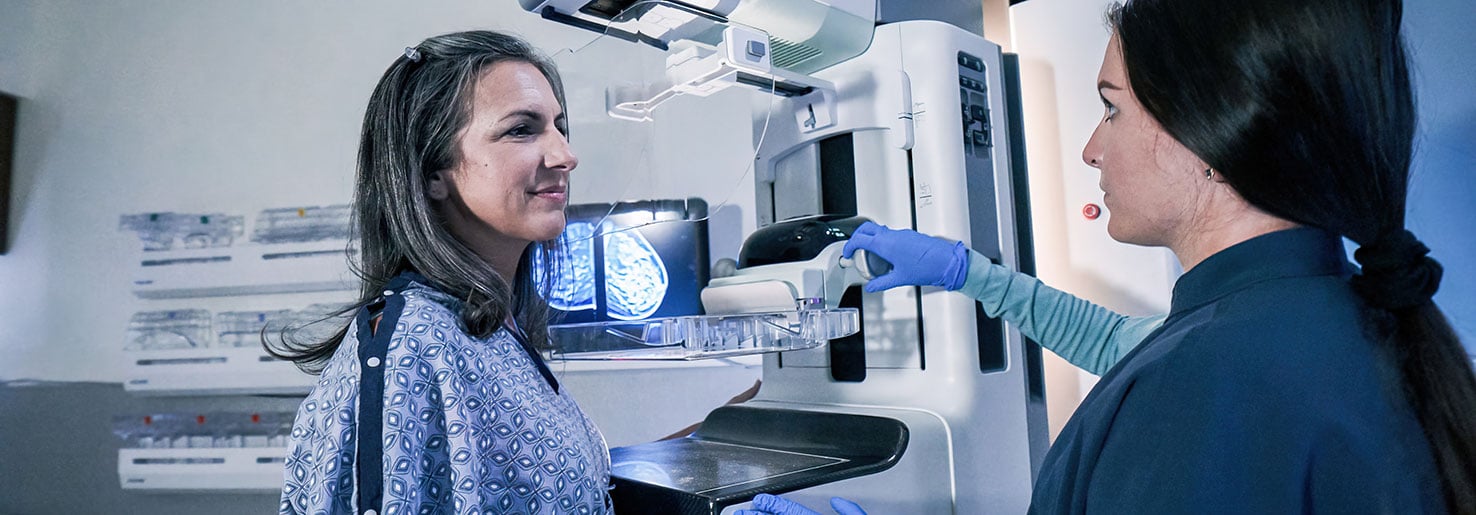
Ductal Carcinoma in Situ (DCIS) Causes and Risk Factors
Ductal carcinoma in situ (DCIS) is the earliest stage of breast cancer. Also known as stage 0, DCIS occurs when cells that line a milk duct become cancerous but remain in place. The noninvasive tumor does not grow through the wall of the duct, spread to nearby lymph nodes or enter the bloodstream or lymphatic system. In many cases, the condition is detected during a routine mammogram that reveals clusters of microcalcifications in a breast before noticeable symptoms develop.
Even though DCIS remains confined to the breast tissue where it originated, it requires treatment. If left untreated, some of the cancerous cells may continue to grow and spread.
Stage 0 breast cancer is highly treatable, and with early detection and appropriate treatment, most patients achieve a positive outcome. The standard of care for DCIS is breast-preserving surgery, such as a lumpectomy, followed by radiation therapy. Additionally, if a tumor is estrogen-receptor- or progesterone-receptor-positive, hormone therapy may be considered. Because ductal carcinoma in situ is noninvasive, systemic treatments such as chemotherapy are generally unnecessary.
What causes ductal carcinoma in situ?
Scientists do not yet fully understand what causes DCIS or why the tumors do not always spread. Through extensive studies performed to date, researchers have discovered that the cancer forms after healthy cells in a milk duct undergo abnormal DNA changes that cause them to grow uncontrollably. The triggers of the cellular mutations that lead to the development of breast cancer remain unclear.
Through ongoing research, scientists continue to learn more about the specific gene(s) that are damaged during the development of ductal carcinoma in situ and the effects of the genetic damage on formerly healthy breast cells. They are also working to gain a better understanding of why DCIS spreads and becomes invasive in some cases but not others.
At the time of diagnosis, ductal carcinoma in situ is assigned a grade, which can help physicians predict whether the cancer will become invasive. DCIS is graded based on the appearance of the abnormal cells when viewed under a microscope:
- Low grade – The abnormal cells look very similar to healthy breast cells and are growing slowly.
- Intermediate grade – The abnormal cells slightly resemble healthy breast cells and are growing quickly.
- High grade – The abnormal cells look vastly different than healthy breast cells and are growing uncontrollably.
High-grade DCIS is more likely to become invasive breast cancer—and do so over a shorter time—than low-grade DCIS. However, there is currently no way to know for sure that this will or will not happen.
Ductal carcinoma in situ risk factors
Approximately 10% of breast cancer cases are linked to hereditary factors, such as a harmful mutation in breast cancer gene 1 (BRCA1) or breast cancer gene 2 (BRCA2). Other risk factors for DCIS that cannot be controlled include:
- A family history of breast cancer
- A personal history of a benign breast condition, such as atypical hyperplasia
- Early menstruation (before age 12)
- Late menopause (after age 55)
- Late first pregnancy (after age 30)
- No pregnancies
Some risk factors for DCIS that are (or may be) controllable include:
- Tobacco use
- Excessive alcohol consumption
- Obesity or excess body weight
- Hormone replacement therapy
Scientists continue to investigate whether known DCIS risk factors can directly cause healthy breast cells to become cancerous. However, based on what is known thus far, the process more likely involves a complex interplay of multiple hormonal, environmental and lifestyle factors.
Ductal carcinoma in situ prevention
While there is no sure way to prevent DCIS, annual screening mammograms can help detect the cancer early. Early detection of DCIS and other types of breast cancer can lead to a good outcome with less invasive treatment.
While preventing DCIS specifically is unlikely, it is important for everyone to be aware of the risk factors and to take steps to avoid those that are within their control, such as smoking and drinking alcoholic beverages.
Benefit from world-class care at Moffitt Cancer Center
At Moffitt, breast cancer research is one of our primary areas of focus. In addition to investigating how ductal carcinoma in situ develops, we are working to expand its treatment options through our robust portfolio of clinical trials. For instance, our research team is currently studying various hormonal therapies and how they affect hormone receptor-positive cancers. Taking a bench-to-bedside approach, we use our laboratory advances to improve outcomes and quality of life for all current and future breast cancer patients.
If you would like to learn more about DCIS causes and risk factors, you are encouraged to talk with a specialist in the Don & Erika Wallace Comprehensive Breast Program at Moffitt. To request an appointment, call 1-888-663-3488 or submit a new patient registration form online. We do not require referrals.
Diagnosis
